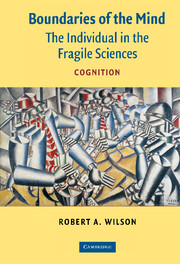Book contents
- Frontmatter
- Contents
- List of Tables and Figures
- Acknowledgments
- Boundaries of the Mind
- PART ONE DISCIPLINING THE INDIVIDUAL AND THE MIND
- PART TWO INDIVIDUALISM AND EXTERNALISM IN THE PHILOSOPHY OF MIND AND THE COGNITIVE SCIENCES
- PART THREE THINKING THROUGH AND BEYOND THE BODY
- PART FOUR THE COGNITIVE METAPHOR IN THE BIOLOGICAL AND SOCIAL SCIENCES
- 11 Group Minds in Historical Perspective
- 12 The Group Mind Hypothesis in Contemporary Biology and Social Science
- Notes
- References
- Index
11 - Group Minds in Historical Perspective
Published online by Cambridge University Press: 02 December 2009
- Frontmatter
- Contents
- List of Tables and Figures
- Acknowledgments
- Boundaries of the Mind
- PART ONE DISCIPLINING THE INDIVIDUAL AND THE MIND
- PART TWO INDIVIDUALISM AND EXTERNALISM IN THE PHILOSOPHY OF MIND AND THE COGNITIVE SCIENCES
- PART THREE THINKING THROUGH AND BEYOND THE BODY
- PART FOUR THE COGNITIVE METAPHOR IN THE BIOLOGICAL AND SOCIAL SCIENCES
- 11 Group Minds in Historical Perspective
- 12 The Group Mind Hypothesis in Contemporary Biology and Social Science
- Notes
- References
- Index
Summary
GROUP MINDS AND THE COGNITIVE METAPHOR IN THE BIOLOGICAL AND SOCIAL SCIENCES
There are two strands to our thinking about where the mind begins and ends, and the role that the individual has in demarcating that boundary. First, individuals are paradigmatic subjects or bearers of mental states: They are the things, perhaps the only things, which literally have minds. Minds are where, perhaps only where, people are. Second, individuals serve as some sort of boundary for the mind. Minds are located inside individuals, and we do not need to consider the body or the extracranial world in theorizing about the nature of minds. The argument of Parts Two and Three has been that this second strand to our thinking about the relationship between individuals and minds is mistaken. For the most part, this rejection of the mind as bounded by the individual has gone hand-in-hand with the acceptance of minds as belonging to individuals.
In Part Four, this latter view is reconsidered. I shall take seriously the idea that individuals are not the only kind of thing that has a mind. In particular, I focus on the idea that groups can have minds. Doing so will take us beyond the cognitive to both the biological and social sciences. For it is in these other parts of the fragile sciences that the idea of a group mind has a rich history, a history appealed to in a number of contemporary discussions.
- Type
- Chapter
- Information
- Boundaries of the MindThe Individual in the Fragile Sciences - Cognition, pp. 265 - 285Publisher: Cambridge University PressPrint publication year: 2004
- 1
- Cited by



